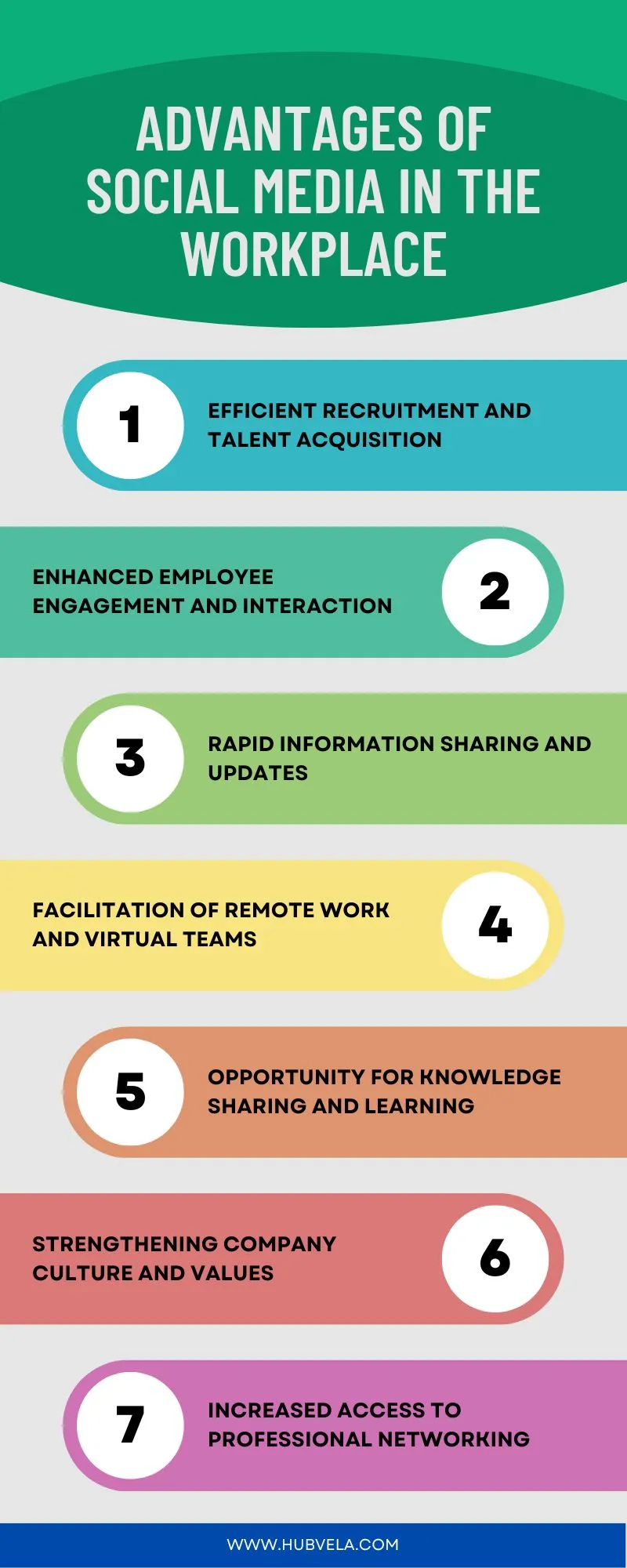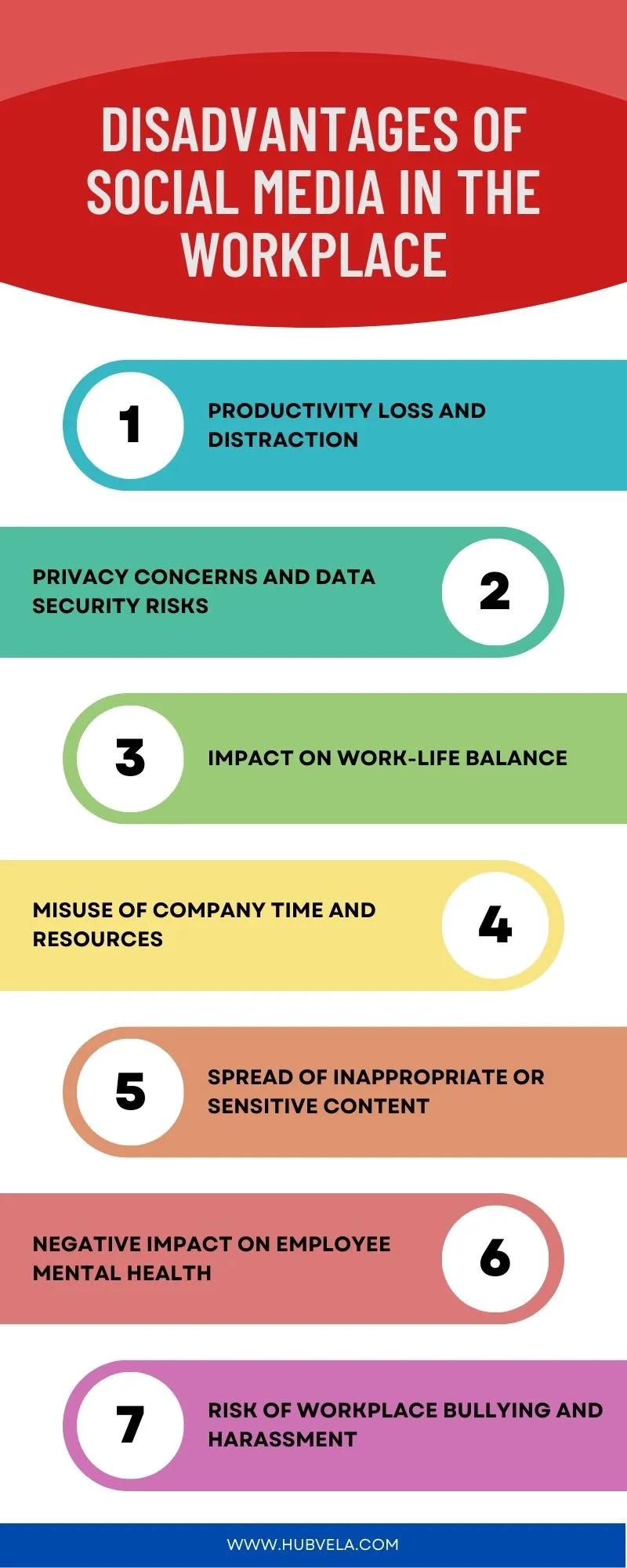Social media has become an integral part of our daily lives, and its use in the workplace is a topic of debate. While some argue that social media can be a distraction and decrease productivity, others believe that it can improve employee engagement and collaboration.
In this article, we will explore the advantages and disadvantages of social media in the workplace. We will discuss how social media can improve employee engagement, boost productivity, and facilitate collaboration.
We will also examine the potential downsides of social media, such as employee distraction and cybersecurity risks.

--Advertisement--
Advantages of Social Media in The Workplace
Social media has become an integral part of our daily lives, and its use has extended to the workplace as well.
While some employers may be hesitant to allow social media use during work hours, there are several advantages to doing so. We will explore the benefits of using social media in the workplace.

1. Efficient Recruitment and Talent Acquisition
Social media can be an efficient tool for recruitment and talent acquisition in the workplace. Social media platforms like LinkedIn, Facebook, and Twitter can be used to publicize job openings, source candidates, and verify background information.
By using social media to build a strong online presence, companies can showcase their employer brand and attract top talent to the organization.
Social media can also be used to engage with potential candidates and provide them with insights into the company’s culture and values. Additionally, social media can be a cost-effective way of reaching a large audience and promoting job opportunities.
However, it is important for companies to use social media judiciously and in compliance with legal and ethical standards, as social media can also lead to potential legal issues and discrimination claims.
Social media can be an efficient tool for recruitment and talent acquisition, leading to improved business outcomes and employee satisfaction.
2. Enhanced Employee Engagement and Interaction
Enhanced Employee Engagement and Interaction: One of the key advantages of social media in the workplace is the ability to enhance employee engagement and interaction.
Social media platforms provide a space for employees to connect, communicate, and collaborate with one another, regardless of their physical location.
This fosters a sense of community and teamwork among employees, leading to increased engagement and productivity.
Through social media, employees can share ideas, ask questions, and provide feedback in real time, creating a more dynamic and interactive work environment.
Additionally, social media can facilitate knowledge sharing and learning, as employees can easily access and contribute to a wealth of information and resources.
Social media in the workplace promotes a sense of connectivity and engagement among employees, ultimately benefiting the organization as a whole.
3. Rapid Information Sharing and Updates
Social media platforms offer rapid information sharing and updates, which can be advantageous in the workplace. Employees can use social media to discuss ideas, post news, ask questions, and share information with colleagues and professionals in their field.
Social media can also be used to follow professionals and communities of similar practice, allowing for social networking collaboration platforms to boost quality and workflow for the job.
This can work as a collaborative tool, improving workflow and enhancing information discovery and delivery.
However, it is important to note that social media can also be a distraction and lead to non-work-related use while on the job. Therefore, it is recommended that employers establish clear social media policies and guidelines to ensure appropriate employee use.
4. Facilitation of Remote Work and Virtual Teams
Remote work and virtual teams have become increasingly popular in recent years, and social media can play a significant role in facilitating communication and collaboration among team members.
One of the primary benefits of using social media to stay connected in a virtual team is that it allows team members to communicate and share information in real time, regardless of their location. This can lead to increased productivity and faster time to market.
Additionally, virtual teams can be more cost-effective than traditional teams, as they allow companies to manage their work from anywhere.
However, managing virtual teams requires the right tools and knowledge for virtual collaboration, and employers must offer technology that supports a successful work-from-home environment.
The facilitation of remote work and virtual teams through social media can provide numerous advantages for companies and employees alike.
5. Opportunity for Knowledge Sharing and Learning
Social media can provide an opportunity for knowledge sharing and learning in the workplace.
Employees can follow industry leaders, join professional groups, and participate in online communities to stay up-to-date with the latest trends and best practices in their field.
Social media platforms can also be used to publicize job openings, source candidates, and verify background information, which can help attract top talent to the organization.
LinkedIn, in particular, is a valuable professional networking site that can create a lot of positive buzz about a company and convey its culture to potential employees.
Furthermore, social media can be a vital forum for information exchange for staff at all levels, allowing them to use blogs, and microblogs, and follow professionals and communities of similar practice.
Social media can provide employees with access to a wealth of knowledge and resources that can help them develop their skills and advance their careers.
6. Strengthening Company Culture and Values
Social media can be a powerful tool for strengthening company culture and values. By allowing employees to share their experiences, insights, and ideas on social media platforms, companies can create a sense of community and foster a shared sense of purpose among their employees.
Social media can also be used to recognize and celebrate employee achievements, which can help boost morale and reinforce company values.
Additionally, social media can be used to showcase the company’s culture and values to potential employees, which can help attract top talent and improve the employer’s brand.
By using social media to promote transparency, collaboration, and open communication, companies can create a positive and inclusive workplace culture that values diversity and innovation.
Social media can be a valuable tool for strengthening company culture and values, leading to increased employee engagement, retention, and business success.
7. Increased Access to Professional Networking
Social media can provide increased access to professional networking opportunities in the workplace. Social media platforms like LinkedIn can be used to connect with other professionals in the same field, join industry groups, and participate in online discussions.
This can help employees expand their professional network and gain exposure to new ideas and perspectives.
Additionally, social media can be used to publicize job openings, source candidates, and verify background information, which can help attract top talent to the organization.
By using social media to build a strong online presence, employees can showcase their skills and expertise to potential employers and clients, leading to new business opportunities and career growth.
Social media can be a valuable tool for increasing access to professional networking opportunities, leading to improved career prospects and business success.
Disadvantages of Social Media in The Workplace
Social media has become an integral part of our lives, and it has also found its way into the workplace. While social media can have advantages in the workplace, such as improving employee engagement and providing a forum for information exchange, it also has its disadvantages.
We will explore the disadvantages of social media in the workplace.

1. Productivity Loss and Distraction
The use of social media in the workplace can lead to productivity loss and distraction. Employees may spend excessive amounts of time on social media platforms, checking notifications, scrolling through feeds, and engaging in online conversations.
This can lead to a decrease in productivity and a loss of focus on work-related tasks. Additionally, social media can be a source of distraction, with employees being tempted to check their accounts during work hours.
This can lead to a decrease in the quality of work produced and can negatively impact the overall performance of the organization.
Therefore, it is important for employers to establish clear guidelines and policies regarding the use of social media in the workplace to minimize the negative impact it can have on productivity and employee performance.
2. Privacy Concerns and Data Security Risks
Social media platforms collect and retain a massive amount of personal data, which can be vulnerable to hacking, scraping, and data breaches.
This can put user information at risk when using social media, and companies collect personal information, along with interests and locations, from the platform by using tracking cookies, geofencing, and cross-site tracking.
Even if an account is private, advertisers and scammers can get sensitive data, such as passwords or security information, through hacking and account takeovers.
Social media users’ concerns about their privacy have spiked in recent years, and incidents of data breaches have alarmed many users and forced them to rethink their trust in social network’s ability to protect privacy and data.
To mitigate these risks, it is important to understand the privacy policies and settings for both personal and business accounts and provide privacy guidelines for employees who use their personal social accounts at work.
3. Impact on Work-Life Balance
The constant access to work through emails, instant messaging, and social media has made it increasingly difficult to disconnect and maintain a healthy work-life balance.
The line between work and personal life has become blurred, and it is up to each individual to find a way to balance the positive impact of technology with its potential drawbacks to achieve a fulfilling and productive life.
Excessive use of social media at work can be bad for employees’ mental health, causing feelings of inadequacy. Moreover, using social media during working hours can reduce productivity and increase the likelihood of making mistakes due to distractions.
Therefore, it is essential to regulate the use of social media, especially during working hours, to avoid compromising work-life balance and productivity.
4. Misuse of Company Time and Resources
The misuse of company time and resources is a significant disadvantage of social media in the workplace. Employees who use social media during working hours can become distracted from their job responsibilities, leading to a reduction in productivity.
Social media can also divert the mind from work to online attractions, leading to a loss of focus and reduced output.
Additionally, the use of social media can lead to the exploitation of company resources and confidential information, as well as an increased need for cybersecurity measures.
Therefore, it is essential for companies to regulate the use of social media in the workplace and implement guidelines for its usage to prevent the misuse of company time and resources.
5. Spread of Inappropriate or Sensitive Content
The spread of inappropriate or sensitive content is a major concern for employers when it comes to social media use in the workplace.
With the ease of sharing information on social media platforms, it is easy for employees to share content that may be offensive or inappropriate. This can lead to a negative impact on the company’s reputation and can even result in legal action.
In addition, sensitive information about the company or its clients may be shared, which can lead to serious consequences.
Employers need to establish clear policies regarding the use of social media in the workplace and provide training to employees on what is considered appropriate content to share.
It is important for employees to understand the potential risks associated with social media use and to act responsibly when using these platforms.
6. Negative Impact on Employee Mental Health
According to various studies, social media can have a negative impact on employee mental health in the workplace. Excessive use of social media can cause psychological stress to employees, leading to reduced job performance.
Spending too much time on social networking sites can harm an employee’s mood and affect their workplace. Social media can also lead to decreased energy, increased frustration, and irritability.
Furthermore, social media can cause employees to feel dissatisfied and disappointed, which can affect their morale and decrease their productivity.
Employers can help mitigate the negative impact of social media on employee mental health by offering tips for setting better boundaries, limiting time spent on social media, and providing awareness courses and workshops on mental health.
7. Risk of Workplace Bullying and Harassment
The use of social media in the workplace can lead to an increased risk of workplace bullying and harassment. An employee may send negative remarks or spread baseless rumors about another colleague, or get into embarrassing situations and post them online.
Cyberbullying can also occur, where employees bully or harass each other online, often through social media platforms, creating a hostile work environment and decreased productivity.
Thanks in part to the anonymity it provides, social media is a preferred way for bullies to go about harassing others. Workplace bullying can lead to higher employee turnover, increased absenteeism, and a loss of productivity.
Employers should never overlook comments or posts that are of bullying or harassing nature and should be able to create and proceed with disciplinary actions against employees who discriminate or harass their other colleagues to maintain a healthy and untroubled atmosphere in the company.
Every employer must have a concrete anti-harassment policy that references social media etiquette and usage, and all employees must be made aware of the consequences of online harassment.
Conclusion on Advantages and Disadvantages of Social Media in The Workplace
In conclusion, social media has both advantages and disadvantages in the workplace. On the positive side, social media can help organizations communicate with their employees and increase work engagement, leading to improved job performance.
It can also facilitate communication and collaboration among colleagues, especially in remote work settings.
However, social media use can also be a distraction and lead to decreased productivity if not managed properly. Additionally, employers need to be mindful of ethical considerations and respect employees’ privacy when monitoring their social media use.
Overall, social media can be a valuable tool in the workplace if used appropriately and with consideration for its potential drawbacks.


